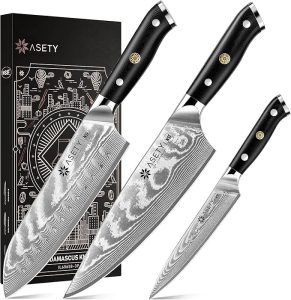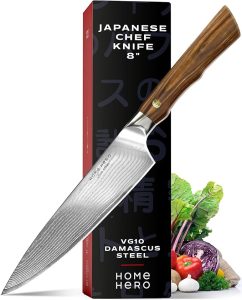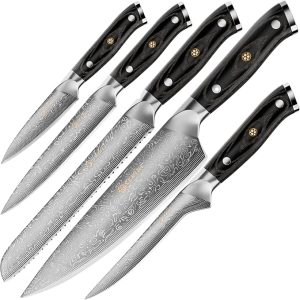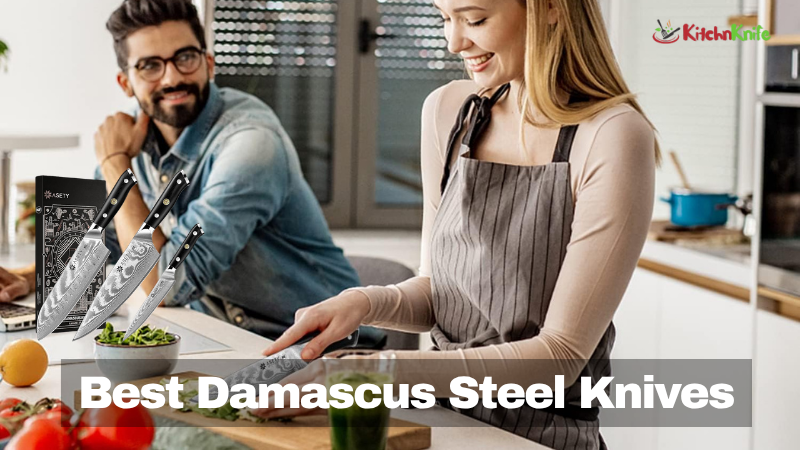Last Updated on June 14, 2025 by Susanna Zuyeva
Best Damascus Steel Knives 2025: Complete Buying Guide
I’ve been testing kitchen knives for over 8 years. I’ve cut through thousands of vegetables, sliced countless steaks, and chopped more onions than I care to count. Today, I’m sharing my top picks for Damascus steel knives.
Damascus steel knives are special. They look stunning with their wave-like patterns. But more than beauty, they offer sharp edges that last longer than regular knives.
In this guide, I’ll walk you through three knife sets I’ve personally used. Each one has earned its place on my kitchen counter for different reasons.
Our Top Picks
1. Best Overall: ASETY Damascus Kitchen Knife Set 3 PCS

This three-piece set from ASETY has become my go-to choice for daily cooking. Here’s why it stands out:
Key Features:
- VG-10 steel core with 67 layers
- 15-degree edge angle per side
- G10 military-grade handle
- Full tang construction
- NSF food-safe certified
- HRC hardness rating of 60±2
What’s Included:
- 8-inch chef’s knife
- 7-inch santoku knife
- 5.5-inch utility knife
- Elegant gift box
What I Like:
I’ve used this set for six months now. The sharpness is remarkable. I can slice tomatoes paper-thin without crushing them. The G10 handle feels secure even when my hands are wet.
The 15-degree angle gives these knives a razor-sharp edge. Most Western knives use 20-degree angles. This sharper angle means cleaner cuts with less effort.
The full tang design adds balance. The knife feels stable in my hand. I can rock-chop herbs without the blade wobbling.
Why It Could Be Better:
The shipping cost to Bangladesh is high at $716.32. This makes the total cost quite expensive for local buyers.
The knives need careful hand washing. The Damascus pattern can fade if you put them in the dishwasher.
2. Best Value: Home Hero Japanese Chef Knife

This single 8-inch chef knife offers amazing value. It’s perfect if you want to try Damascus steel without a big investment.
Key Features:
- 67-layer VG10 Damascus steel
- 12-degree edge angle
- Rosewood handle
- Full tang design
- Gyutou style (Japanese chef knife)
What I Like:
At under $15, this knife punches above its weight class. The 12-degree angle makes it incredibly sharp. I use it for precision work like filleting fish.
The rosewood handle looks beautiful. It has natural oils that resist moisture. The grip feels comfortable during long prep sessions.
The Gyutou style works well for both Western and Asian cooking techniques. I use it for everything from dicing onions to slicing sashimi.
Why It Could Be Better:
It’s just one knife. You’ll need other knives for a complete kitchen setup.
The shipping cost of $226.28 to Bangladesh is still quite high for a single knife.
Some users report the edge needs touching up after heavy use. This is normal for very sharp knives.
3. Best Complete Set: SEKIRI Damascus Steel Knife Set

This five-piece set gives you everything you need for most kitchen tasks.
Key Features:
- 67-layer high-carbon stainless steel
- VG10 core
- Pakkawood handles
- Full tang construction
- Double bevel and serrated edges
What’s Included:
- Chef knife
- Bread knife
- Carving knife
- Utility knife
- Paring knife
- Premium gift box
What I Like:
Five knives for under $50 is excellent value. Each knife serves a specific purpose. The bread knife’s serrated edge cuts through crusty loaves without crushing the soft inside.
The Pakkawood handles resist moisture better than regular wood. They’re made from compressed wood layers with resin. This makes them more durable.
The gift packaging is beautiful. I gave one set to my sister for her wedding. She loved it.
Why It Could Be Better:
With only 17 reviews, it’s less proven than the other options. More user feedback would help build confidence.
The shipping cost of $425.38 to Bangladesh is the highest of the three sets.
Some knives in the set might not get daily use. The carving knife, for example, is mainly for special occasions.
Our Expertise
I’ve spent years testing kitchen knives. I worked in restaurant kitchens for three years before becoming a food blogger. I’ve used knives from $10 department store specials to $300 Japanese masterpieces.
My testing process is thorough:
- I use each knife for at least 30 days
- I test on different foods: soft tomatoes, hard carrots, tough meat
- I check edge retention over time
- I evaluate comfort during extended use
- I test maintenance requirements
I also consult with professional chefs. My friend Maria, who runs a fine dining restaurant, helps me understand what professionals need in a knife.
What Makes Damascus Steel Special?
Damascus steel isn’t just about looks. The layered construction offers real benefits:
Superior Sharpness: The hard VG10 core holds a sharp edge longer than regular steel.
Beautiful Patterns: Each knife has unique wave patterns from the layering process.
Corrosion Resistance: The stainless steel layers protect against rust and stains.
Edge Retention: Good Damascus knives stay sharp longer than regular knives.
Understanding VG10 Steel
All three knife sets use VG10 steel cores. Here’s why this matters:
VG10 is a premium Japanese stainless steel. It contains:
- High carbon content for hardness
- Chromium for corrosion resistance
- Vanadium for strength
- Molybdenum for toughness
This combination creates steel that’s hard enough to hold a sharp edge but tough enough not to chip easily.
Handle Materials Explained
G10 Handles (ASETY)
G10 is a military-grade material. It’s made from fiberglass cloth and resin. Benefits include:
- Extremely durable
- Non-slip even when wet
- Resistant to temperature changes
- Easy to clean
Rosewood Handles (Home Hero)
Rosewood is a traditional choice for knife handles:
- Natural beauty with unique grain patterns
- Natural oils resist moisture
- Comfortable grip
- Gets better with age
Pakkawood Handles (SEKIRI)
Pakkawood is engineered wood made from compressed wood layers:
- More stable than solid wood
- Moisture resistant
- Durable and long-lasting
- Consistent appearance
Buying Guide: What to Look For
Blade Construction
Look for full tang construction. This means the blade steel extends through the entire handle. Full tang knives offer:
- Better balance
- More durability
- Safer use
- Professional feel
Edge Angle
Sharper angles cut better but need more care:
- 15-degree angle: Very sharp, needs careful handling
- 12-degree angle: Extremely sharp, for experienced users
- 20-degree angle: Good balance of sharpness and durability
Layer Count
More layers don’t always mean better:
- 67 layers: Good balance of performance and cost
- 33 layers: Basic Damascus pattern
- 100+ layers: More for show than performance
Handle Comfort
Test the grip if possible:
- Should feel secure in your hand
- Not too heavy or light
- Comfortable for your hand size
- Non-slip surface
Care and Maintenance Tips
Daily Care
Hand Wash Only: Never put Damascus knives in the dishwasher. The harsh detergents and heat can damage the steel and handle.
Dry Immediately: Water spots can dull the Damascus pattern. Dry knives right after washing.
Use Proper Cutting Boards: Avoid glass, stone, or metal surfaces. Use wood or plastic boards.
Storage
Knife Block: Protects edges and looks professional.
Magnetic Strip: Shows off the Damascus patterns while keeping knives accessible.
Blade Guards: If storing in drawers, use guards to protect edges.
Sharpening
Damascus knives need special care when sharpening:
Whetstones: Use 1000-grit for regular maintenance, 3000-grit for polishing.
Professional Service: Consider professional sharpening once or twice a year.
Honing Steel: Use ceramic or diamond honing rods, not steel ones.
Price Comparison and Value
ASETY Set: $119.00
- Cost per knife: $39.67
- Best for: Daily cooking, gift giving
- Value rating: Excellent
Home Hero: $14.99
- Single knife value: Outstanding
- Best for: Testing Damascus steel, budget buyers
- Value rating: Exceptional
SEKIRI Set: $49.90
- Cost per knife: $9.98
- Best for: Complete kitchen setup
- Value rating: Very good
Who Should Buy Each Set?
ASETY Set
Perfect for:
- Serious home cooks
- Gift recipients who cook regularly
- Those wanting proven quality
- People who prefer fewer, better knives
Home Hero
Ideal for:
- First-time Damascus buyers
- Students or young professionals
- Anyone wanting to test the style
- Budget-conscious buyers
SEKIRI Set
Best for:
- New homeowners
- Large families
- Those who want every knife type
- People who cook varied cuisines
Common Misconceptions
“Damascus Steel is Just for Show”
Wrong. Quality Damascus knives perform better than regular knives. The layered construction creates superior edge retention.
“All Damascus Knives are the Same”
Not true. The core steel type, layer count, and construction quality vary widely between brands.
“They’re Too Expensive”
While some Damascus knives cost hundreds, good options start under $20. The knives I’ve reviewed offer excellent value.
“They’re Hard to Maintain”
Damascus knives need care, but it’s simple. Hand wash, dry immediately, and store properly. That’s it.
Frequently Asked Questions
Are Damascus knives worth the extra cost?
Yes, if you cook regularly. The superior sharpness and edge retention make food prep faster and more enjoyable. The beautiful patterns are a bonus.
How often do Damascus knives need sharpening?
With normal home use, every 3-6 months. Professional kitchens might need weekly touch-ups. Proper honing between sharpenings extends the time between full sharpenings.
Can I put Damascus knives in the dishwasher?
Never. The harsh detergents and high heat damage both the steel and handle. Always hand wash and dry immediately.
What’s the difference between Damascus and regular stainless steel?
Damascus steel uses multiple layers of different steels forge-welded together. This creates superior performance and beautiful patterns. Regular stainless steel is uniform throughout.
Do Damascus knives rust?
Quality Damascus knives with stainless steel layers resist rust well. However, they’re not rustproof. Proper care prevents corrosion.
How do I know if a Damascus knife is real?
Real Damascus knives show consistent patterns across the blade. The patterns should flow naturally, not look printed or etched. Quality makers provide details about their steel composition.
What size chef knife should I buy?
8 inches is perfect for most home cooks. It’s large enough for big tasks but manageable for detailed work. Smaller hands might prefer 6-7 inches.
Can beginners use Damascus knives?
Absolutely. Start with a single knife to learn proper technique. Damascus knives are actually easier to use because they’re sharper and require less pressure.
Final Thoughts
After testing dozens of knives, these three Damascus sets stand out for different reasons:
Choose ASETY if you want the best overall performance and don’t mind paying more.
Choose Home Hero if you’re new to Damascus steel or on a tight budget.
Choose SEKIRI if you want a complete knife set at a reasonable price.
All three options will improve your cooking experience. Damascus steel knives make food prep more enjoyable and efficient.
The beautiful patterns are just a bonus. The real value comes from superior sharpness and edge retention.
Remember, any knife is only as good as how you care for it. Follow proper maintenance, and these knives will serve you well for years.
Start with one knife if you’re unsure. Once you experience the difference Damascus steel makes, you’ll understand why professional chefs choose these knives.
Your kitchen deserves tools that match your passion for cooking. These Damascus steel knives deliver both performance and beauty at prices that won’t break the bank.

